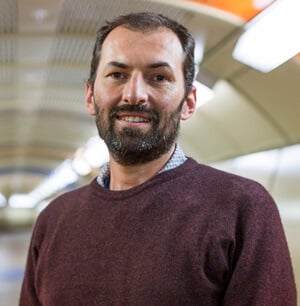2025 Achievement Award Lectures
Hall 2/3
Salt Palace Convention Center
Proctor Medal Lecture
Monday, May 5
11:30am - 12:15pm MT
 Christine Curcio, PhD, FARVO and Cynthia Owsley PhD, MSPH, FARVO
Christine Curcio, PhD, FARVO and Cynthia Owsley PhD, MSPH, FARVO
The science of rod-mediated dark adaptation for age-related macular degeneration
Aging is the largest risk factor for age-related macular degeneration (AMD), a global cause of central vision loss. Drs. Owsley and Curcio lead the Alabama Study of Age-related Macular Degeneration 2, a prospective observational study seeking functional and imaging outcomes at the aging-AMD intervention. ALSTAR2 relies on an accurate mathematical description of photoreceptors and supporting cells around the foveal singularity and a deposit-driven AMD progression sequence involving impaired transport to and from the circulation: the Center-Surround model of cone resilience and rod vulnerability. A dynamic measure of rod function (rod-mediated dark adaptation) at the rim of the high-risk macula lutea is affected earlier than steady-state measures of rods, cones or neural circuitry. This research unites fundamental neuroscience, visual psychophysics, molecular pathology, cellular-level imaging and epidemiology over four decades to enable precision prevention and early interventions for AMD.
Friedenwald Award Lecture
Monday, May 5
12:15 - 1pm MT
 Connie Cepko, PhD
Connie Cepko, PhD
The retina: A mosaic of radial founder cell clones
The retina is a remarkable tissue, with more than120 cell types, and many circuits dedicated to transforming light into useful information regarding our world. We are interested in the strategy used by the retina to produce so many cell types, and distribute them fairly equally across the tissue. We are also interested in the mechanisms used for cell fate choice among the many progeny of multipotent progenitor cells. A model for the overarching strategy, based upon lineage studies and birthdating, will be presented. It posits that the retina is a mosaic of founder cell clones arranged in radial arrays across the retina, with each clone producing progenitor cells that undergo intrinsic changes in their ability to make different retinal cell types. Gene expression patterns and the mechanisms used to pattern the high acuity area across several species will be covered.
Weisenfeld Award Lecture
Wednesday, May 7
8:30 - 9:15am MT
 Geeta K. Vemuganti, DNB, FAMS, MD, FARVO
Geeta K. Vemuganti, DNB, FAMS, MD, FARVO
Regeneration and cancer: Understanding the two sides of the same coin - Stem Cells
Stem cells with property to self-renewal and differentiate are explored for various cellular therapies while the mutated stem cells, which generate a tumor, are targeted for elimination to control tumor progression and chemo-resistance. We document the use of cultivated Limbal stem cells in restoration of the ocular surface in severe limbal stem cell deficiency, with more than 70% success. The potential use of cultured conjunctival cells, limbal stromal cells and lacrimal gland cells with secretory potential is encouraging. This study details the isolation and characterization of cancer stem cells and the role of small extracellular vesicles in tumor progression and metastasis in retinoblastoma. The reduction of chemo-resistance with nano-formulated drugs and targeted delivery of drug loaded-small extracellular vesicles derived from the tumor cells, appear promising. Regenerative potential of normal stem cells and tumor initiation by cancer stem cells are the two contrasting sides of the same coin that warrant exploration.
Cogan Award Lecture
Wednesday, May 7
9:15 - 10am MT
 Alex Hewitt, PhD, FARVO
Alex Hewitt, PhD, FARVO
Genomic led treatment paradigms for glaucoma
Glaucoma is a leading cause of irreversible blindness worldwide. Early detection is crucial, as existing treatments are unable to reverse optic nerve damage, yet blindness from Primary Open Angle Glaucoma (POAG) can be prevented by timely intervention. POAG is one of the most heritable complex diseases, and although rare disease causing variants have been identified, the majority of people manifest POAG due to the accumulation of hundreds of common genetic variants. In recent years a number of loci have been definitively associated with POAG, facilitating the development of robust polygenic risk scores.
These scores have proven effective in predicting disease risk, and need for treatment escalation, yet prospective trials are required to establish clinic utility. This lecture will explore how combining genetic insight with tools such as patient-specific induced pluripotent stem cells and single cell RNA-seq technology will facilitate the development and validation of novel therapies.

